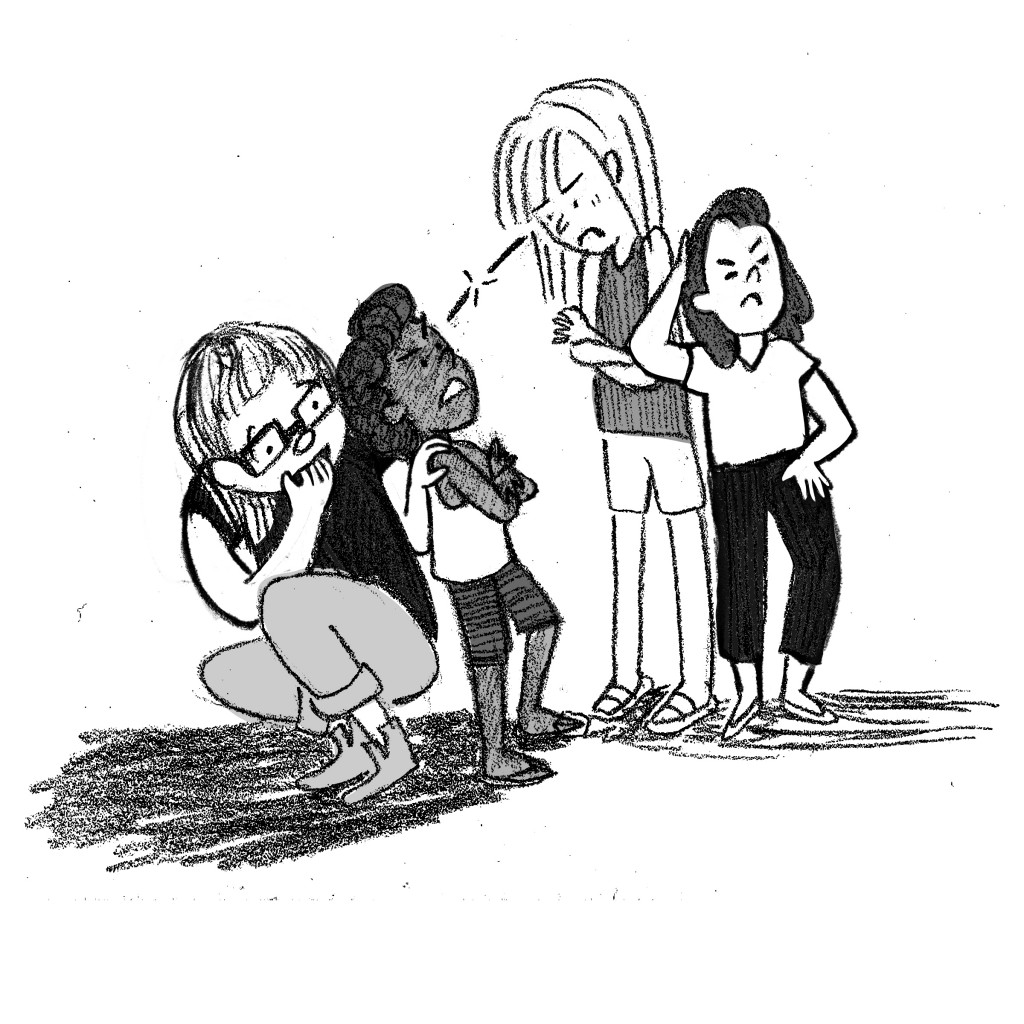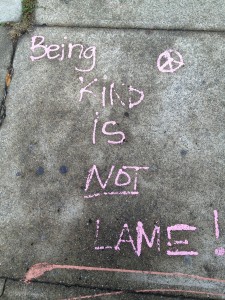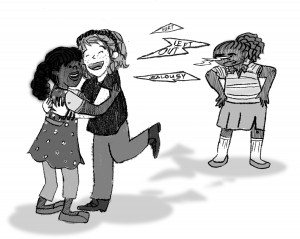|
|
October 9, 2013
I just came off a radio interview on the topic of teen dating violence. (Excellent timing for my Kindness and Respect Challenge. )One of the other guest experts, Associate Professor Emily Rothman of Boston University School of Public Health, said that 10% of teens report having experienced physical violence in a dating relationship. (Hitting, slapping, kicking, sexual coersion, etc.) Apparently that number has been fairly constant over the past 15-20 years. What has been increasing is emotional/psychological abuse in dating relationships. That ranges from name-calling, insults and threats, to dictating what a partner can wear and who s/he can talk to. 25-30% of teens report having experienced emotional/psychological dating abuse. Any controlling behavior (typically on the part of males toward females) is disrespectful. It also frequently leads to physical violence. Because many girls value their close relationships so much it can be hard for them to stand up for themselves and set boundaries.
In this recent email a girl describes to me the disrespectful treatment she gets in a friendship. Substitute the word “boyfriend” for “best friend” and you’ll see we’re talking about a common challenge for teen girls: “How do I get the respect I deserve from the people I care about?”
Hey Terra,
I have a best friend and she’s keeping me in jail. (Well, that’s what I think.) It’s like she won’t let me be friends with anyone or else she’ll be jealous. If she’s jealous, she’ll seek for revenge and I will be miserable and not able to concentrate on my studies. I’ve always wanted to tell her that I don’t wanna be her best friend anymore but I don’t have the confidence to say that. My heart says it’s the best thing to do. Do you think it’s the right decision?
Don’t Wanna Be a Doormat
Dear Don’t Wanna Be,
I agree with your heart. From what you describe, this “best friend” of yours isn’t acting like a friend at all. In your own words she:
• gets jealous if you are friends with anyone
• seeks for revenge
What kind of “friend” is that!?
Do I have to tell you your next best move? Nah. You already know what you need to do. This friendship is not a healthy one. It lacks the key ingredient: mutual respect. This is bullying prevention month. And what’s going on in this friendship is a form of bullying.
You need to end this. I know that is a scary thought. So take some slow deep breaths, right here, right now, and calm yourself. Get your confidence up and say to yourself, “I deserve friends who treat me with respect.” Think it and say it over and over until you can say it with confidence and know that it’s true.
Get to that point and you should be able to say something like this to your friend, “When you try to control who I am friends with by getting jealous and angry at me, I feel like I am in jail. Friends shouldn’t treat each other that way. It’s disrespectful. I’ve been feeling like this for a while but I haven’t told you. Even though I was scared I should have told you. Friends should be able to talk to each other about the hard stuff. I apologize. We don’t seem bring out the best in each other. That is why I am taking a break from this friendship.”
I hope this helps.
In friendship,
Terra
——–
Tune in tomorrow (Day 10) for an update from Don’t Wanna Be a Doormat
*(Excerpted from my upcoming The Girls Q&A Book on Friendship)
UPDATE October 3, 2014: The Girls Q&A Book on Friendship: 50 Ways to Fix a Friendship Without the DRAMA is now available in print and on Kindle (the ebook can be read on any device, your mobile phone, tablet, or computer with the free Kindle reader app). Visit GirlsQandA.com for an excerpt, reviews, and to order your copy.

October 7, 2013
On Saturday (Day 5 of the Challenge) I drove to Stanford to a Challenge Success student event. My job was to lead two round table discussions. The topic: “Too Stressed to Think?” in which I would help tweens and teens understand the link between being in so-called emergency mode and doing stuff we later regret.
I’ve written a lot about stress over the past eight years. Done countless presentations for kids and the adults who live and work with them. Even though Saturday’s event was at a world-class university, teaching doesn’t rattle me. What did shake me up in advance was the challenge of finding exactly where I needed to be. Stanford is a big place and map-reading is not my thing.
Arriving in the vicinity I asked some students for directions to the Graduate School of Education. They wanted to help, but they were newbies and like I said, Stanford is huge. So they kindly brought over this older guy who knew the campus well. He was kind and patient. Helped me decipher my map (yeah, I had one) then told me a) where to park-no charge on weekends! and b) where my building was.
After the event, heading back to my car, I spotted two confused people peering at a map. I asked them if they were lost. They were looking for the campus bookstore. I admitted I was also a visitor, but I wanted to help them. (Pass it forward, right?) Between their map and my knowledge of the name of the building I had just emerged from, we figured it out.
So, take this into the new week: We’re here to help each other. Sure, there are more self-serving ways to play the game, but I don’t recommend them. For one thing, it feels good to help. For another, there’s karma and being helpful will help you. If you need more motivation to go out of your way to help other people, how about this: it’s the right thing to do. Not always easy, as I told the girl who asked this question, but always right.
Got another minute? Read on:
 A girl has bullied me forever. She just got glasses and now people are making fun of her. Should I stick up for her? (from The Girls Q&A Book on Friendship, by Annie Fox, illustrated by Erica De Chavez, © 2014 by Annie Fox and Erica De Chavez. Now available)* What a great question! Isn’t life interesting the way things can turn around? This girl picked on you, so you might be thinking, “Why should I help her?” The answer is simple: Because she needs a friend right now. Another reason you should help is because you know exactly how bad it feels to be teased. If you stand by and let others make fun of her you’ll be unhappy because you’ll know, deep inside, that you could have done something to make things better.
The answer to your question is yes! Stick up for the girl with the glasses. It’s the right thing to do. But you already know that because you’ve got a hero’s heart (otherwise it wouldn’t bother you that people are making fun of her).
If you help her maybe she’ll learn something about the importance of respect and kindness. Then who knows? This may be the beginning of a great new friendship!
*(Excerpted from my upcoming The Girls Q&A Book on Friendship)
Check out Day 8 of The Kindness and Respect Challenge
UPDATE October 3, 2014: The Girls Q&A Book on Friendship: 50 Ways to Fix a Friendship Without the DRAMA is now available in print and on Kindle (the ebook can be read on any device, your mobile phone, tablet, or computer with the free Kindle reader app). Visit GirlsQandA.com for an excerpt, reviews, and to order your copy.

October 1, 2013
October is National Bullying Prevention Month. Not sure what we’re expected to work on for the rest of the year, but I’m up for treating people better, at least through Halloween.
Unlike highly successful education campaigns of the past: Don’t Be a Litter Bug and Buckle Up for Safety because Only You Can Prevent Forest Fires, if you go by surveys, our 10+ year war on bullying hasn’t yet reached the tipping point.
There’s no one solution to verbal abuse and the rest of the social garbage that has become the norm for our kids, online and off. Something’s gotta give and each of us has the power to make things better. I never took physics, but I know that everyday nastiness and social aggression adds to the garbage. So it stands to reason that more kindness and respect will move the needle in the other direction.
That’s why, starting today, to honor the good intentions of National Bullying Prevention Month, I’m beginning my own month-long Kindness and Respect Challenge (aka #KindRespect).
 Kindness and Respect Challenge Here’s the idea: between now and October 31st, I will actively look for opportunities to be kind and respectful to others. I realize it’s going to take serious anger management and mouth control on my part. I also understand I’m inviting the the Universe to throw a whole lot of “tests” my way, but I’m in and I’ll be reporting my experiences right here every day.
Who’s in with me?
In friendship,
Annie
PS Encourage your kids to join the Kindness and Respect Challenge along with you (and the whole family). Create a #KindRespect chart (could be on the fridge or posted on a wall) in which each one of you who RECEIVES an act of kindness and/or a show of respect from another family writes it down. For example, John might write on the chart, “Trevor helped me with my homework.” Way to go, Trevor! Or Trevor might write, “Mom, made me a snack.” Yay, Mom! At the end of the week, acknowledge the cumulative effects of more kindness and respect in the family. Change happens when we change how we treat each other.
Check out Day 2

September 27, 2013
I originally wrote a version of this article for TakePart.com
When it comes to teaching kids to be good people, we parents repeat ourselves… a lot. That’s OK, because young skulls are thick and young minds are often distracted. We continue harping on the rules because we want our kids to act responsibly, even when we’re not around. That’s why it’s so gratifying to hear a good report about our kids from teachers or from other parents. At those times, all a proud mom or dad should do is smile graciously and reply, “That’s so nice to hear.” But what do you do with a negative report from school? That’s what this parent wanted to know:
I just received a dreaded phone call from my nine-year-old’s teacher saying that he is goofing off during class time and not staying focused. How can I show him there are consequences for him acting that way in school?
 I didn't do anything!
Use these tips to discuss out-of-line behavior with your child so s/he gets a clear message yet still feels loved and supported:
1. Get the facts. Before talking with your child, talk with the teacher. Find out exactly what’s going on and how it has been handled so far. Find out if other students are involved. The more information you have for your upcoming discussion with your child, the better.
More: How to Help Your Kids Deal With Peer Conflicts at School
2. Talk with your co-parent. If there are two parents in your child’s life, teaching him or her to do the right thing should involve both of them. Whether you are co-parenting under the same roof or not, getting both parents on the same page adds twice the reinforcement for the course correction your child needs. Being on different pages (or in different books!) sends mixed messages. Suppose one parent says, “Emma, when you’re in class your job is to be the good student I know you can be. That means showing your teacher respect by paying attention.” And the other parent chuckles and says, “Fooling around in class? That’s my girl! I gave my teachers a hard time, too.” Obviously, no responsible parent would ever say that, but you get the idea why staying on message is so important.
3. Talk with your child. Call a family meeting and bring snacks. (Always appreciated) Present the information you have. Stay calm as you ask, “What’s true about your behavior in class?” Your child will likely deny the teacher’s report, to which you might reply, “If it’s not accurate, why do you think s/he said it?” You might hear, “The teacher hates me.” Or “I dunno.” Don’t buy it but don’t lose your cool. Simply put on your Good Cop hate and dig deeper. After some more gentle encouragement in the direction of the truth, your child may walk back the denial. “I might have been fooling around a little, but I wasn’t the only one.” Or, “I’d pay more attention if Mr. __ wasn’t so boring!” These are justifications for bad behavior. Acknowledge them calmly, but don’t invest any money. Simply repeat the question, “What’s true about your behavior in class?” At this point, your child may confess, “I guess sometimes I talk while the teacher is talking.” Now we’re getting somewhere!
4. Help your child take responsibility. We control our own behavior. Sure, other people may influence our choices, but ultimately our decisions (to act out in class, to blow off a homework assignment, to spread a nasty rumor, etc.) are our own. Teach your children well. This one’s an important life lesson.
5. Move forward. Work with your child to create some new strategies for being a more attentive student. That includes new ways to respond to distractions in class, when the focus ought to be on the teacher, or at home, when the focus ought to be on homework.
6. Follow up. Work together to set realistic short-term goals and hold your child accountable. If s/he has been failing to turn in daily homework, set up a goal for the next one to two weeks that all homework will be completed (to the best of his/her ability) and turned in on time. Let your child share his/her progress with you. Acknowledge progress! If you need to, stay on top of things (without hovering).
In all of this, your long-term parenting objective is helping your child understand that negative feedback can provide a valuable opportunity to make positive changes in school and in life.
 — Older Posts »
| |















